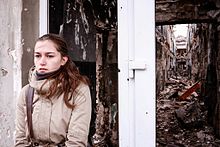
Back الوضع الإنساني خلال الحرب في دونباس Arabic Situación humanitaria durante la guerra del Dombás Spanish Situasi kemanusiaan selama perang di Donbas ID Гуманитарные последствия войны в Донбассе Russian Donbas Savaşı sırasında insani durum Turkish Гуманітарні наслідки російсько-української війни (з 2014) Ukrainian 頓巴斯戰爭與人道主義危機 Chinese

During the ongoing Russo-Ukrainian War between the Ukrainian government forces and pro-Russian separatists in the Donbas region of Ukraine that began in April 2014, many international organisations and states noted a deteriorating humanitarian situation in the conflict zone.
A May 2014 report by the United Nations said there had been an "alarming deterioration" in human rights in territory held by Russian separatists affiliated with the Donetsk People's Republic (DPR) and Luhansk People's Republic (LPR).[1] The UN Human Rights Monitoring Mission in Ukraine (HRMMU) reported growing lawlessness in the region, documenting cases of targeted killings, torture, and abduction.[2] HRMMU also reported threats against, attacks on, and abductions of journalists and international observers, as well as the beatings and attacks on supporters of Ukrainian unity.[2] A report by Human Rights Watch said "Anti-Kiev forces in eastern Ukraine are abducting, attacking, and harassing people they suspect of supporting the Ukrainian government or consider undesirable...anti-Kiev insurgents are using beatings and kidnappings to send the message that anyone who doesn't support them had better shut up or leave".[3]
Non-governmental organisations, such as Amnesty International, also raised concerns about the behaviour of some Ukrainian volunteer battalions. Amnesty International said that they often acted like "renegade gangs", and were implicated in torture, abductions, and summary executions.[4][5][6]
In a report from HRMMU, again in May 2014,[7] Ivan Šimonović, UN Assistant Secretary General for Human Rights,[8] wrote about illegal detention, abduction and intimidation of election officials in the self-proclaimed pro-Russian republics, and called for urgent action to prevent a Balkans-style war.[9] He also warned of a humanitarian crisis due to a failure of social services in the region, and an exodus of people from affected areas.[10] In October 2015, the DPR and LPR banned non-governmental organisations such as Doctors Without Borders and World Food Programme from the territory that they control.[11] A report released on 3 March 2016 by the Office of the United Nations High Commissioner for Human Rights (OHCHR) said that people that lived in separatist-controlled areas were experiencing "complete absence of rule of law, reports of arbitrary detention, torture and incommunicado detention, and no access to real redress mechanisms". In addition, the report noted "allegations of violations perpetrated with impunity by Ukrainian law enforcement officials—mainly elements of the Security Service of Ukraine (SBU)—including enforced disappearances, arbitrary and incommunicado detention, and torture and ill-treatment".[12][13]
According to the United Nations Children's Fund (UNICEF), "The results of a psychosocial assessment of children in Donetsk Oblast in Eastern Ukraine are deeply troubling ... and indicate that about half of all children aged 7–18 have been directly exposed to adverse or threatening events during the current crisis."[14] OSCE monitors spoke to refugees from Donetsk city in Zaporizhia. They said that men were "often not allowed" to leave the city, but were instead "forcibly enrolled in 'armed forces' of the so-called 'Donetsk People's Republic' or obliged to dig trenches".[15]
By June 2015, the conflict had created 1.3 million internally displaced people (IDPs).[16] According to the OHCHR, this number had grown to 1.6 million people by early March 2016.[17]As of December 2022, the total number of IDPs has increased to 5.9 Million following the Russian invasion.[18]
- ^ "Ukraine crisis: UN sounds alarm on human rights in east". BBC News. 16 May 2014. Retrieved 17 May 2014.
- ^ a b Report on the human rights situation in Ukraine (PDF). Office of the United Nations High Commissioner for Human Rights. 15 May 2014. Archived (PDF) from the original on 27 March 2022.
{{cite book}}:|website=ignored (help) - ^ "Ukraine: Anti-Kiev Forces Running Amok". Human Rights Watch. 23 May 2014. Retrieved 24 July 2014.
- ^ Cite error: The named reference
AI24DECwas invoked but never defined (see the help page). - ^ "Ukraine: Mounting evidence of war crimes and Russian involvement" (Press release). Amnesty International. 5 September 2014. Retrieved 3 January 2015.
- ^ Cite error: The named reference
AI20OCTwas invoked but never defined (see the help page). - ^ "Human Rights Situation in Ukraine Continues To Deteriorate". newsroomamerica.com. 22 May 2014. Archived from the original on 24 May 2014. Retrieved 22 May 2014.
- ^ Обращение ДНР ко всему цивилизованному миру [Appeal by DPR to the entire civilised world]. Russian World in Ukraine (in Russian). 28 April 2014. Archived from the original on 23 May 2014. Retrieved 28 April 2014.
- ^ "UN's Ivan Simonovic Fears Ukraine Heading for Bloody Balkans-Style War". IBT. 18 May 2014. Retrieved 18 May 2014.
- ^ "U.N. sees abductions, intimidation of election officials in Ukraine". Reuters. 19 May 2014. Retrieved 19 May 2014.
- ^ "Ukraine's Donetsk rebels ban MSF, UN agencies". Yahoo! News. Reuters. 23 October 2015. Retrieved 8 November 2015.
- ^ Ukraine: growing despair among over three million civilians in conflict zone – UN report, United Nations (3 March 2016)
- ^ Report on the human rights situation in Ukraine 16 November 2015 to 15 February 2016 (PDF). Office of the United Nations High Commissioner for Human Rights. 3 March 2016. Retrieved 3 March 2016.
- ^ "Violence in Eastern Ukraine taking a heavy toll on children: UNICEF Assessment". UNICEF. 1 July 2014. Archived from the original on 19 October 2017. Retrieved 8 November 2015.
- ^ Cite error: The named reference
OSCE717was invoked but never defined (see the help page). - ^ Cite error: The named reference
kp25615was invoked but never defined (see the help page). - ^ Cite error: The named reference
UND3316was invoked but never defined (see the help page). - ^ "Ukraine — Internal Displacement Report — General Population Survey Round 11 (25 November - 5 December 2022) | Displacement". displacement.iom.int. Retrieved 4 January 2023.
© MMXXIII Rich X Search. We shall prevail. All rights reserved. Rich X Search